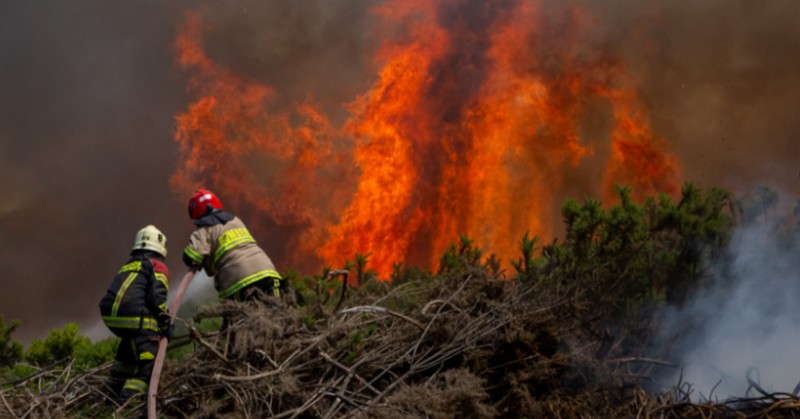Forestry sector reports severe crisis with loss of 3,200 jobs per year and decline in plantations
- René Muñoz, manager of Acoforag, agreed with CMPC's stance. He added that "the lack of progress in forestry incentives to recover burned forest areas over the last seven years, along with insecurity and rural challenges for forestry workers in the southern macrozone, is the scenario leading companies to believe their forestry business is no longer viable in Chile but in neighboring countries that welcome private investment with open arms."
The loss of thousands of jobs over the past 10 years, the sharp decline in productive plantations, and the disappearance of contractor companies are some of the effects of the severe crisis affecting the forestry industry, according to sector stakeholders.
Major industry business associations have joined the debate about the "retreat" of this sector, which, as warned by CMPC president Luis Felipe Gazitúa in a letter to shareholders published last Friday in "El Mercurio," is due to forest fires, timber theft, land seizures, and insecurity.
On Tuesday, Agriculture Minister Esteban Valenzuela told this outlet that claims of a "retreat" are unfounded and highlighted the growth in forestry exports this year.
Juan José Ugarte, president of the Chilean Wood Corporation (Corma), stated that "denying the retreat of the forestry sector is ignoring reality, and it is regrettable that such a statement comes from the minister himself. The situation facing the forestry sector is extremely serious."
Ugarte noted that "over 10 years, the forestry sector has shrunk by 14%. Some 700,000 hectares of plantations have burned, representing a third of the national forestry heritage. Over 100,000 hectares have been seized or are inaccessible, and contractor companies in the sector have faced more than 400 attacks, many of which have led to their closure."
The industry representative pointed out that "the sector's crisis has meant the loss of 3,200 jobs per year (on average between 2012 and 2022)." He also emphasized that the country has lost an average of 35,000 hectares annually over the past decade, while afforestation rates dropped by 99% and reforestation by 27% during the same period. He added that the national forestry GDP has declined by 20%.
"As industry associations, we have been raising this issue for over a year, requesting support for small forest owners affected by fires to replant their burned hectares. Despite this, recovery plans included no measures for forestry SMEs, who have been waiting since 2017 for any state assistance," Ugarte stated.
Michel Esquerré, president of PymeMad, an association of forestry SMEs, said that small and medium-sized firms accounted for 10% of timber exports in 2017, but today that figure is half. He explained that the sector is no longer planting after harvesting pine forests, "which means the future supply for SMEs will worsen. So, this isn’t just a retreat—it’s the disappearance of the SME industry."
Esquerré noted that small and medium landowners lack the capacity to finance 20-year plantations, especially with added "fire risks." He added, "We are doomed to disappear unless there is real and effective collaboration from the state."
In this regard, he argued that the forestry decline is "far worse" than what CMPC described.
René Muñoz, manager of the Chilean Forestry Contractors Association (Acoforag), agreed with CMPC's position. He added that "the lack of progress in forestry incentives to recover burned forest areas over the last seven years, along with insecurity and rural challenges for forestry workers in the southern macrozone, is the scenario leading companies to believe their forestry business is no longer viable in Chile but in neighboring countries that welcome private investment with open arms."
Muñoz recounted that "for forestry contractors—businesses facing terrorist violence in the south—the numbers are revealing: 30 contractors have left the sector, meaning 2,500 to 3,000 workers have lost their jobs over 10 years, all exhausted by the state’s neglect of a problem dating back to 1997."
Rodrigo O'Ryan Blaitt, president of the Chilean Biomass Association (ACHBIOM), which represents pellet, woodchip, and firewood producers, supported CMPC's analysis and disagreed with "the optimistic outlook based on last year’s export figures" cited by Minister Valenzuela. "We believe the current crisis is structural, and its devastating effects will intensify in the short term," he said.
O'Ryan warned that the loss of raw material availability "poses a serious and imminent threat."
Proposals
The ACHBIOM president stated that wood construction programs are "a hopeful initiative for the future" but cautioned that "their success is compromised without the necessary raw materials." He stressed "the urgent need to reforest, restore fire-damaged areas, and reestablish the rule of law in territories occupied by violent and criminal groups."
Juan José Ugarte said that in the short term, "we need support for SMEs" to resume planting, calling a "promotion law essential." He added that "in the medium term, the government must take on the forestry challenge for a sustainable Chile. In a world affected by climate change, having more forests is crucial—both for carbon capture and, in the case of productive forests, for producing raw and recyclable materials to replace plastics and petroleum derivatives."
Acoforag representative René Muñoz asserted that alongside "restoring afforestation rates to 35,000–40,000 hectares per year, as seen 12 years ago," forestry institutions must be improved. He proposed creating "a forestry undersecretariat to establish long-term public policies and avoid fleeting ideologies." Still, he emphasized that "the most important thing is regaining the freedom to work and recognizing that the state is responsible for ensuring safety conditions."
Arauco: "Without many more forests, Chile has no future"
Arauco, the Angelini Group’s forestry company, also expressed concern about the industry’s state. "Our main worry is the systematic decline in the country’s planted area, with no concrete signs of reversal, leading to reduced productive and industrial activity, especially among small and medium-sized players," said Charles Kimber, Arauco’s Corporate Manager of People and Sustainability.
He stated, "We must regain competitiveness by confronting—not lowering our guard against—fires, timber theft mafias, and violent groups. We’ve made improvements in these areas, but they must be sustained."
Regarding solutions, the executive commented, "We must create better conditions, foster a suitable long-term environment. On the supply side, investing in forests is critical—we need more nature to meet Chile’s 2030 international climate goals. Without many more forests, Chile has no future. Our sector is part of the identity of south-central Chile. The entire industry shares the concern to revitalize forestry, especially for SMEs." He added, "We need to boost reforestation."
The note in El Mercurio’s subscription edition:
https://digital.elmercurio.com/2024/04/10/B/N64DOCE2#zoom=page-width















